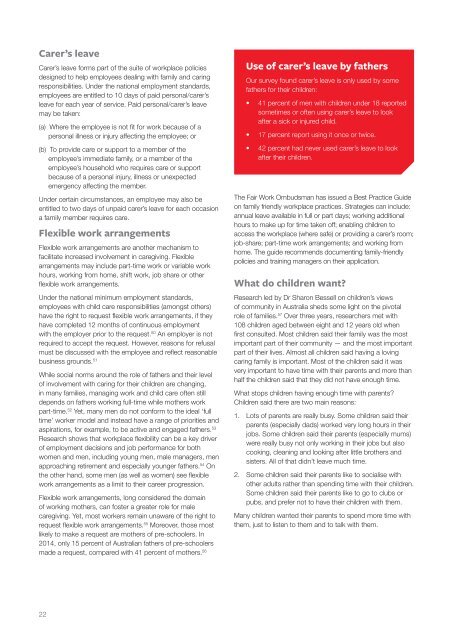State of Australia’s Fathers
1iGWp7w
1iGWp7w
- No tags were found...
Create successful ePaper yourself
Turn your PDF publications into a flip-book with our unique Google optimized e-Paper software.
Carer’s leave<br />
Carer’s leave forms part <strong>of</strong> the suite <strong>of</strong> workplace policies<br />
designed to help employees dealing with family and caring<br />
responsibilities. Under the national employment standards,<br />
employees are entitled to 10 days <strong>of</strong> paid personal/carer’s<br />
leave for each year <strong>of</strong> service. Paid personal/carer’s leave<br />
may be taken:<br />
(a) Where the employee is not fit for work because <strong>of</strong> a<br />
personal illness or injury affecting the employee; or<br />
(b) To provide care or support to a member <strong>of</strong> the<br />
employee’s immediate family, or a member <strong>of</strong> the<br />
employee’s household who requires care or support<br />
because <strong>of</strong> a personal injury, illness or unexpected<br />
emergency affecting the member.<br />
Under certain circumstances, an employee may also be<br />
entitled to two days <strong>of</strong> unpaid carer’s leave for each occasion<br />
a family member requires care.<br />
Flexible work arrangements<br />
Flexible work arrangements are another mechanism to<br />
facilitate increased involvement in caregiving. Flexible<br />
arrangements may include part-time work or variable work<br />
hours, working from home, shift work, job share or other<br />
flexible work arrangements.<br />
Under the national minimum employment standards,<br />
employees with child care responsibilities (amongst others)<br />
have the right to request flexible work arrangements, if they<br />
have completed 12 months <strong>of</strong> continuous employment<br />
with the employer prior to the request. 50 An employer is not<br />
required to accept the request. However, reasons for refusal<br />
must be discussed with the employee and reflect reasonable<br />
business grounds. 51<br />
While social norms around the role <strong>of</strong> fathers and their level<br />
<strong>of</strong> involvement with caring for their children are changing,<br />
in many families, managing work and child care <strong>of</strong>ten still<br />
depends on fathers working full-time while mothers work<br />
part-time. 52 Yet, many men do not conform to the ideal ‘full<br />
time’ worker model and instead have a range <strong>of</strong> priorities and<br />
aspirations, for example, to be active and engaged fathers. 53<br />
Research shows that workplace flexibility can be a key driver<br />
<strong>of</strong> employment decisions and job performance for both<br />
women and men, including young men, male managers, men<br />
approaching retirement and especially younger fathers. 54 On<br />
the other hand, some men (as well as women) see flexible<br />
work arrangements as a limit to their career progression.<br />
Flexible work arrangements, long considered the domain<br />
<strong>of</strong> working mothers, can foster a greater role for male<br />
caregiving. Yet, most workers remain unaware <strong>of</strong> the right to<br />
request flexible work arrangements. 55 Moreover, those most<br />
likely to make a request are mothers <strong>of</strong> pre-schoolers. In<br />
2014, only 15 percent <strong>of</strong> Australian fathers <strong>of</strong> pre-schoolers<br />
made a request, compared with 41 percent <strong>of</strong> mothers. 56<br />
Use <strong>of</strong> carer’s leave by fathers<br />
Our survey found carer’s leave is only used by some<br />
fathers for their children:<br />
• 41 percent <strong>of</strong> men with children under 18 reported<br />
sometimes or <strong>of</strong>ten using carer’s leave to look<br />
after a sick or injured child.<br />
• 17 percent report using it once or twice.<br />
• 42 percent had never used carer’s leave to look<br />
after their children.<br />
The Fair Work Ombudsman has issued a Best Practice Guide<br />
on family friendly workplace practices. Strategies can include:<br />
annual leave available in full or part days; working additional<br />
hours to make up for time taken <strong>of</strong>f; enabling children to<br />
access the workplace (where safe) or providing a carer’s room;<br />
job-share; part-time work arrangements; and working from<br />
home. The guide recommends documenting family-friendly<br />
policies and training managers on their application.<br />
What do children want?<br />
Research led by Dr Sharon Bessell on children’s views<br />
<strong>of</strong> community in Australia sheds some light on the pivotal<br />
role <strong>of</strong> families. 57 Over three years, researchers met with<br />
108 children aged between eight and 12 years old when<br />
first consulted. Most children said their family was the most<br />
important part <strong>of</strong> their community — and the most important<br />
part <strong>of</strong> their lives. Almost all children said having a loving<br />
caring family is important. Most <strong>of</strong> the children said it was<br />
very important to have time with their parents and more than<br />
half the children said that they did not have enough time.<br />
What stops children having enough time with parents?<br />
Children said there are two main reasons:<br />
1. Lots <strong>of</strong> parents are really busy. Some children said their<br />
parents (especially dads) worked very long hours in their<br />
jobs. Some children said their parents (especially mums)<br />
were really busy not only working in their jobs but also<br />
cooking, cleaning and looking after little brothers and<br />
sisters. All <strong>of</strong> that didn’t leave much time.<br />
2. Some children said their parents like to socialise with<br />
other adults rather than spending time with their children.<br />
Some children said their parents like to go to clubs or<br />
pubs, and prefer not to have their children with them.<br />
Many children wanted their parents to spend more time with<br />
them, just to listen to them and to talk with them.<br />
22


